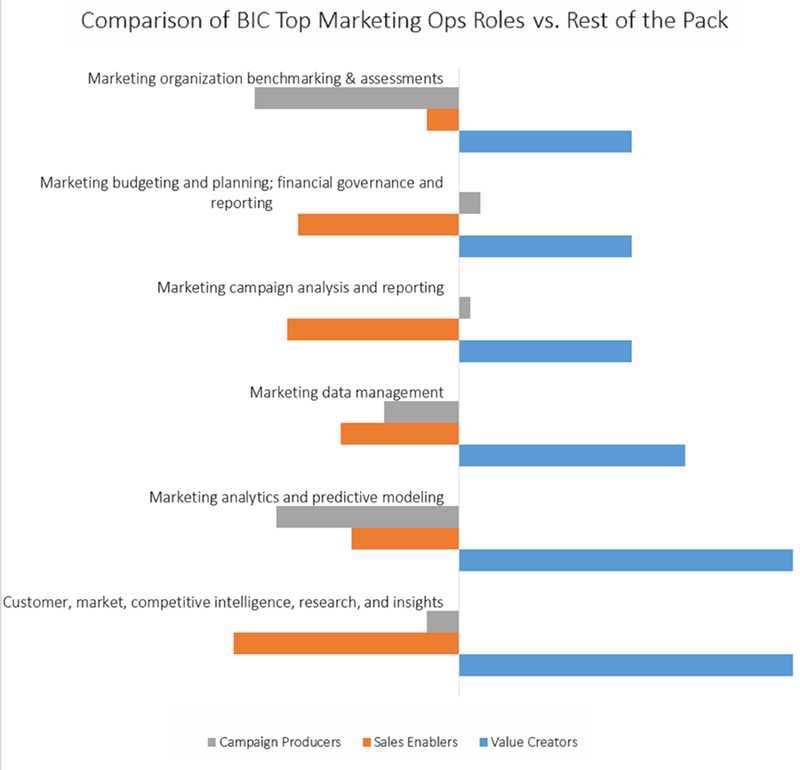The role of operations management was originally applied only to manufacturing processes and systems. With the proliferation of marketing automation tools and increased pressure from the C-Suite to prove the value of Marketing, marketing ops management is gaining traction; for all but the smallest organizations, it is now a "must have."
Our performance management study first explored the role of marketing operations (marketing ops) in 2007. It found that companies were beginning to explore adding marketing ops to the marketing function to help ensure that systems, processes, and tools were in place to support marketing performance measurement and management.
By 2009, the Lenskold Group and others began to incorporate questions about marketing ops into their studies. The 2009 Lenskold Group/MarketSphere Marketing ROI and Measurement Study uncovered a key business statistic that supports the benefit of implementing the marketing ops role: Companies with marketing ops in place were twice as likely (11% vs. 5%) to be high-performing companies—i.e., they report having highly effective and efficient marketing.
Five years ago, the scope of Marketing Ops was typically marketing project management and marketing governance. With marketing performance management moving to the front burner, especially for best-in-class marketers (those marketers earning top marks from the C-Suite for the ability to measure Marketing value, impact and contribution), the role of Marketing Ops is expanding.

The 2014 VisionEdge Marketing/ITSMA study found that the role of Marketing Ops now includes the following (in no particular order):
- Performance measurement and reporting
- Campaign analysis and reporting
- Technology and automation and pipeline management
- Budgeting and planning; financial governance and reporting
- Data management
- Workflow process development and documentation
- Project management
- Strategic planning
- Organization benchmarking and assessments
- Customer, market, competitive intelligence, research, and insights
- Analytics and predictive modeling
- Talent and skills development
Best-in-class (BIC) marketers can be characterized as value creators because their primary focus is on using data to make market, customer, and product/service decisions that create value for customers and shareholders. Accordingly, the following are top roles for marketing ops function among the value creators, in priority order:
- Customer, market, competitive intelligence, research, and insights
- Analytics and predictive modeling
- Data management
- Campaign analysis and reporting
- Budgeting and planning; financial governance and reporting
- Organization benchmarking and assessments

Source: 2014 VisionEdge Marketing/ITSMA MPM Study
The emphasis on intelligence, insights, analytics, modeling, and data management makes sense, considering the focus on value creation. With the pressure increasing on Marketing to measure its value and contribution, Marketing Ops is the logical entity to champion and orchestrate the six A's of marketing performance management: alignment, accountability, analytics, automation, alliances and assessment.
To join these BIC marketers, focus on the following:
- Alignment: We know with statistical significance that BIC marketers take a different approach to aligning marketing with the business. They connect marketing activities and investments to business results, and take their alignment efforts beyond the sales function. Marketing ops in these organizations facilitate the alignment process and oversee the development of a customer-centric marketing plan that ensures that the marketing investment portfolio supports measurable marketing objectives that will have a direct impact on the business.
- Accountability: BIC marketers have a framework for establishing the metrics to measure and report on Marketing's value, impact, and contribution. They know which outcomes and metrics matter to the leadership team. Marketing ops drives the development of the framework and key performance indicators (KPIs). They manage the mechanics of measurement, perform the analysis, and publish the performance results. Marketing Ops translates marketing metrics into an actionable marketing dashboard that the leadership team and the marketing team can use to make strategic, tactical, and investment decisions.
- Analytics: In today's fact-based environment, data and analytics are table stakes. Marketing organizations need to be able to quickly synthesize data and gain actionable insights. Marketers need the analytical muscle to build and use models to make smart investments and strategic decisions. Marketing Ops constructs and maintains an environment that enables Marketing to better use data and analytics.
- Automation: The technology available to help Marketing measure and report on performance is extensive and growing. From marketing resource management to business intelligence to data management systems to reporting platforms to scenario analysis tools, Marketing Ops selects, deploys, and manages the automation and technology infrastructure to support the department. The deployment of a technology infrastructure, training, and change management falls under the auspices of Marketing Ops and serves as the big "I"—the infrastructure that Marketing needs to guide decisions, improve its capabilities, and prove its value.
- Alliances: Much has been written about the need for Marketing to form strong, more explicit, alliances with Sales, IT, and Finance, as well as with the service and product functions. Marketing Ops is the conduit between Marketing, Sales, Finance, and the executive team. It forms and manages these alliances so everyone on the team is "rowing in the same direction." As part of its work, Marketing Ops should craft the operating level agreement that serves as the "rules and roles of engagement" for each of these partnerships and ensures that the liaisons from each group are included in appropriate meetings and decisions.
- Assessment: Continuous improvement is at the heart of assessment and benchmarking. It can only be achieved within a culture where there is genuine concern, dedication, and a willingness among management and employees to improve. While the marketing executive sets the direction and vision for the team, Marketing Ops conducts the benchmarking and assessments to determine what standards, best-practices, processes, and skills are needed to help the marketing team realize its aspiration. Marketing Ops enables marketing organizations to become, and serve as, a center of excellence.
The role of Marketing Ops is expanding, especially within marketing organizations serving as value creators. Within these organizations, the marketing ops function is moving beyond campaign automation and financial governance to facilitate alignment, accountability, and agility.
Marketing Ops has the opportunity to enable Marketing to become more effective by developing and managing the processes for setting performance expectations, monitoring progress, and measuring results. By creating or expanding the marketing ops role and skill set to include performance targeting skills and process and technology optimization, as well as strategic capabilities to drive change, Marketing can reach the next step on its performance management journey.
Although it is the responsibility of every marketing professional to engage in performance management, Marketing Ops brings all of the components together to enable Marketing to optimize performance and to serve as a center of excellence.




